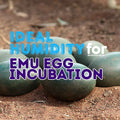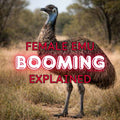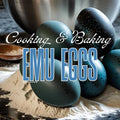
Nutritional Requirements of Emus in Every Life Stage
Learn the essential nutritional requirements for emus, including balanced diets, necessary supplements, and feeding considerations for each life stage. Ensure your emus thrive with expert tips on optimal nutrition.
Begin feeding a higher protein diet to breeding emus 6 weeks before breeding season begins.
Subscribe
To join our mailing list and never miss an update!
Ensuring proper nutrition for emus is crucial to their health and development. Emus have unique dietary needs that differ from other birds, and meeting these requirements can be challenging but rewarding. This article will explore the essential components of a balanced emu diet, the role of supplements, and how nutritional needs change at different life stages. Whether you opt for manufactured feed or decide to mix your own, understanding these nutritional essentials is key to raising healthy, thriving emus.

the foundations of a good emu diet
The basic building blocks of any balanced emu diet will include carbohydrates, protein, amino acids, vitamins and minerals. Each of these groups supports the health and vitality of emus in a different way. For example, food products that contain carbohydrates provide an energy source for the body to perform all its functions while protein is crucial to strong muscle development and maintenance.
The importance of vitamins and minerals cannot be underestimated. In particular the B-vitamin family is often the culprit when emus exhibit health problems such as wry neck. Riboflavin, otherwise known as B-2, is UV sensitive and its’ value in feed will decrease when exposed to sunlight.
Supplementing feed with a dressing such as B-complex pellets or a Vitamin-B rich vegetable such as kale may be necessary if you begin to see lethargy or illness in your emu mob. Each B-vitamin serves a specific purpose in the bird’s development and details information can be found in our article: ‘Importance of B-Vitamins to Poultry Health and Development’.

As emus mature, their nutritional requirements change. Additionally, the nutritional requirements during breeding season are also different than the rest of the year. This is because the male eats very little and needs fat stores that it draws on while incubating eggs. Breeder diets should include in increase in protein 4-6 weeks before the breeding season begins.
It is worth noting, if you notice a pattern of health and development problems in emu chicks, the issue is probably a nutritional imbalance in the breeding pair that is being passed down to the chick in the egg development process. Healthy and nutritionally strong breeding pairs will produce not only healthier chicks but also have a higher rate of fertility in the eggs themselves.

Although emus are in the same ratite family as ostrich, their digestive system and nutritional requirements are more similar to a turkey with a few exceptions. Emus do not require an iron supplement and fiber is not a primary concern because emus do not convert fiber efficiently. As a result, most recommend only 9% or less fiber in emu rations. A study done by the Iowa State University has recommended the following nutritional requirements for emus at each of their life stages.

Reading the label on Emu Feed
The recommended nutritional requirements can be met through a number of sources and will vary depending on the brand you select. Common sources of important nutrients in emu feed will be listed as one or more of these ingredients on the label:

pre-packaged emu feed options
Because there is very little research published on the nutritional requirements of emus, choosing a pre-packaged ratite feed, such as Mazuri or Kalabash, is often the best option for emu owners. These companies have teams of scientists experienced in developing the best combination of ingredients to meet the dietary needs of emus. As mentioned above, you may need to supplement their feed with a vitamin and mineral top dressing or fresh vegetables to complete the feed profile.
On Gypsy Shoals Farm, we always supplement Vitamin-B complex for the first 90 days after hatching to ensure proper development during this critical life stage. Juvenile and adult emus get the occasional treat of kale, but mature to healthy and strong adults strictly on packaged ratite feed specifically designed for their stage of development. Emus on pasture will also eat bugs, grubs and even small rodents, supplementing their diet the natural way.

Trending Articles
homemade emu feed options
A mob of ten adult emus will eat an average 30 pounds of feed per day. The high cost involved has led many emu ranchers to look for ways to mix their own nutritionally balanced formulas. Common ingredients used include dry dog food, rabbit food and even deer food along with standard chicken feed.
While these options may be appealing to your wallet, caution should be taken not to also be providing too much of another ingredient which can cause long-term damage such as selenium, copper, manganese and sodium.
Furthermore, it’s important to realize that the emu’s body may not process these feed mixes and convert them into vital body building components as efficiently, therefore requiring more feed to get the same nutritional value. In other words, you may end up spending more money because the body is not optimally converting the feed.
beware of selenium toxicity

the takeaway
Trending Products
Copyright©2024 All rights reserved. We love to have you share our article as long as you include a direct link to this page. This article or any portion thereof , including all images, may not be reproduced or used in any manner whatsoever without the express written permission of Gypsy Shoals Farm.



